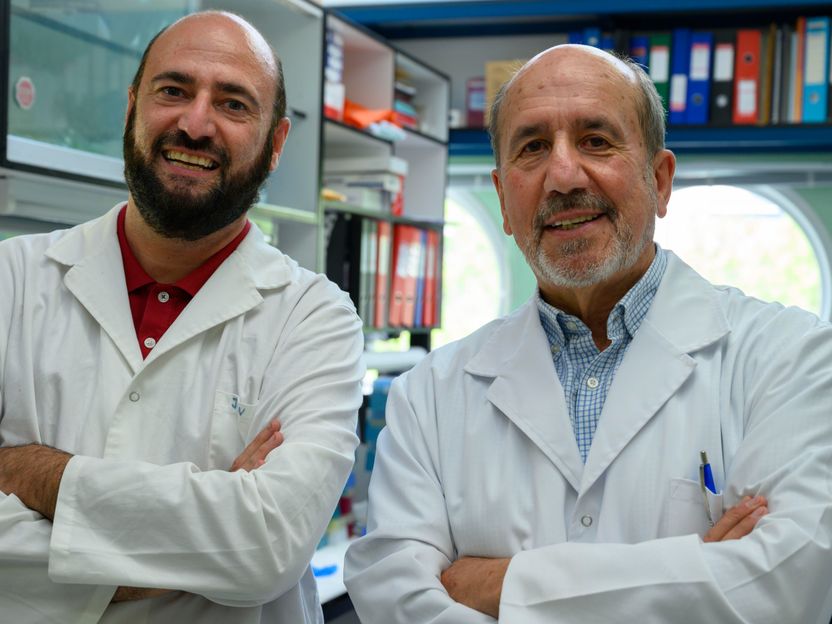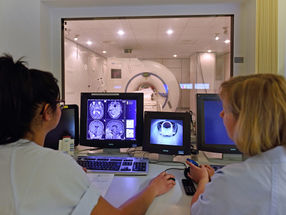CNB-CSIC covid-19 vaccine successfully completes preclinical efficacy and immunogenicity tests against SARS-CoV-2 and variants in animal models
The project shows high immunogenicity and 100% protection against SARS-CoV-2 infection in mice, hamsters and macaques.
Advertisement
The vaccine candidate MVA-CoV2-S for Covid-19, developed by researchers Mariano Esteban and Juan García Arriaza, from the Centro Nacional de Biotecnología (CNB) of the Consejo Superior de Investigaciones Científicas (CSIC), has successfully completed preclinical trials in three animal models: mouse, hamster and macaque. The results, obtained in hamsters and macaques, are published in Frontiers in Immunology.

Researchers Juan García Arriaza and Mariano Esteban, CNB-CSIC.
CSIC
This vaccine candidate is based on a non-replicative attenuated poxvirus called MVA (modified vaccinia virus Ankara) that expresses the SARS-CoV-2 spicule protein (S) in infected cells, thus stimulating immune defense against the coronavirus.
"The results in these three animal models have shown that the vaccine candidate MVA-CoV2-S generates a robust immune response, with high titers of neutralizing antibodies and activation of T lymphocytes, essential markers of efficacy of current vaccines," explains Juan García Arriaza, a researcher at the CNB-CSIC poxvirus and vaccine laboratory.
In addition, "the antibodies generated by the MVA-CoV2-S vaccine neutralize different variants of the SARS-CoV-2 coronavirus, in order of highest to lowest neutralization: alpha, delta, gamma, beta and omicron", emphasizes Mariano Esteban, who heads the CNB-CSIC poxvirus and vaccine laboratory.
Importantly, "the vaccine confers 100% protection against SARS-CoV-2 infection in the three animal models, controlling virus replication in the respiratory tract and lungs, pulmonary pathology and preventing cytokine storm," stress both researchers.
The results obtained in these preclinical studies have been published in international scientific journals during the past and current year. Now, Frontiers in Immunology has published the results of the safety, immunogenicity and efficacy assays of MVA-CoV2-S in hamsters and macaques.
All these studies demonstrate the great contributions of Spanish CSIC scientists in the fight against the covid-19 pandemic, efforts that have allowed the strengthening of research infrastructures in our country and the establishment of important links with companies producing human vaccines. This has been reflected in the close collaboration of the CSIC with the Spanish pharmaceutical company Biofabri, belonging to the Zendal group, which has produced the clinical batches of the vaccine.
The preclinical results obtained with the MVA-CoV2-S vaccine support its future application in clinical trials. However, due to the fact that the Spanish population is mostly vaccinated against SARS-CoV-2, the promoters CSIC and Biofabri have decided to withdraw the request made at the time to the Spanish Agency of Medicines and Health Products (AEMPS) to carry out a clinical trial with the MVA-CoV2-S vaccine in Spain. This does not prevent the vaccine from being considered in other countries and settings, where the vaccination rate is very low and vaccines with high stability are required, and to be used either individually or in combination with other vaccines.
On the other hand, researchers of the CNB-CSIC team continue with the development and optimization of this vaccine, to increase its efficacy against emerging variants of the coronavirus, as well as to achieve a more durable immunity and to study the immunological parameters involved in the protection against the coronavirus.
Note: This article has been translated using a computer system without human intervention. LUMITOS offers these automatic translations to present a wider range of current news. Since this article has been translated with automatic translation, it is possible that it contains errors in vocabulary, syntax or grammar. The original article in Spanish can be found here.
Original publication
Boudewijns R, Pérez P, Lázaro-Frías A, Van Looveren D, Vercruysse T, Thibaut HJ, Weynand B, Coelmont, L, Neyts J, Astorgano D, Montenegro D, Puentes E, Rodríguez E, Dallmeier K, Esteban M, García-Arriaza J (2022); "MVA-CoV2-S vaccine candidate neutralizes distinct variants of concern and protects against SARS-CoV-2 infection in hamsters."; Frontiers in Immunology, 13:845969.



























































